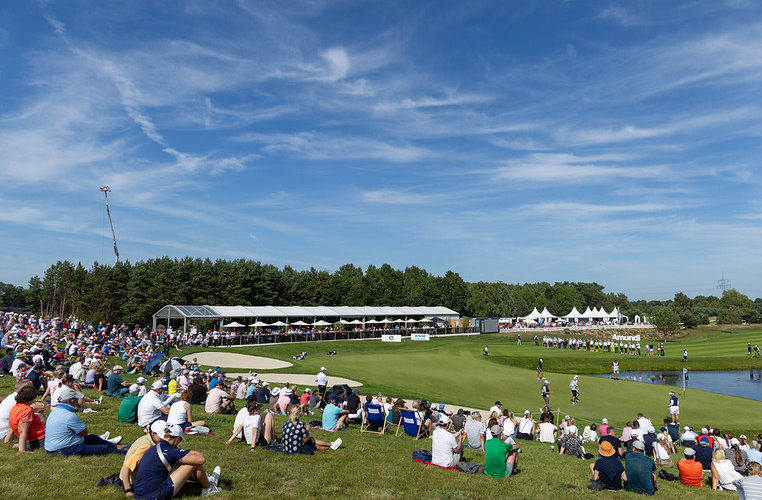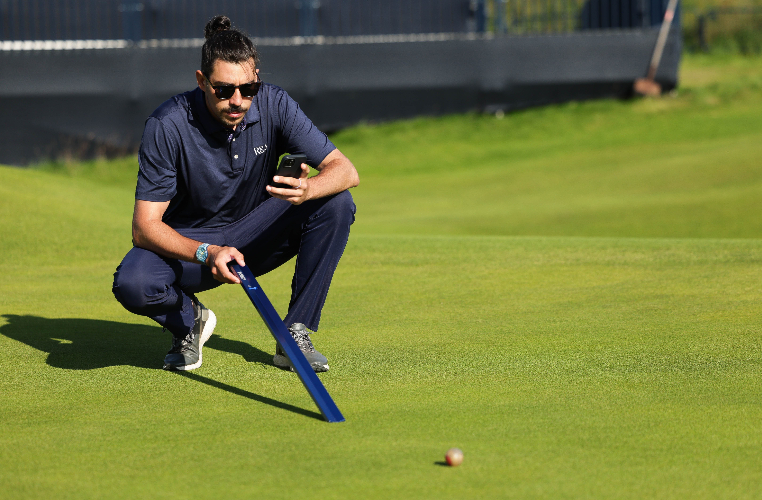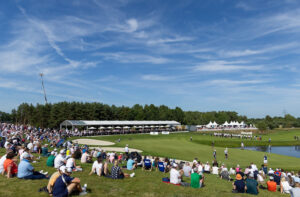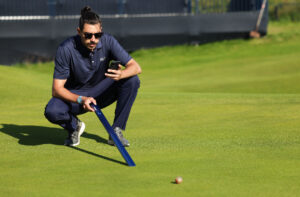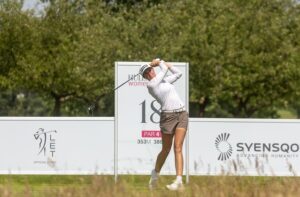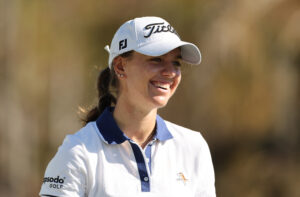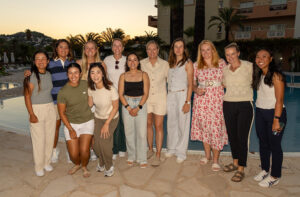Some of the leaders of the Ricoh Women’s British Open talk about a historic first day at St Andrews
Lorena Ochoa, 33-34=67 (-6)
Scorecard: Hole 5, 514-yard par 5: birdie – 50-degree wedge to 10 feet
Hole 8, 154-yard par 3: birdie – 9-iron to seven feet
Hole 9, 347-yard par 4: birdie – wedge to eight feet
Hole 10, 340-yard par 4: birdie – wedge to three feet
Hole 15, 414-yard par 4: birdie – 8-iron to two feet
Hole 17, 453-yard par 5: birdie – 5-iron to 30 feet, two-putt
COLIN CALLANDER: Good morning, we have Lorena Ochoa after a fabulous 6 under par round 67. Very well done. Give us your thoughts on the round today.
LORENA OCHOA: Thank you. Hello, everybody. Yes, it was just a really good day. It was one of those days that things are easy, and really, my tee shots, I was in good positions on the fairways. And I was really glad that I took advantage of the nice conditions in the morning. We got up today with just a little bit of breeze, and I took advantage of that and making some birdies, and now I’m in a good position.
COLIN CALLANDER: What time did you have to get up this morning?
LORENA OCHOA: 5.00 A.M.
COLIN CALLANDER: So you probably did not feel all that great.
LORENA OCHOA: No, it was a really early wake up call but I don’t mind that. I’m a morning person. But my aunt, said, “Oh, you’re going to finish playing around noon; so what are we doing then?” So we have the rest of the afternoon free, but it’s nice, I have some time here and I’m going to spend the day with them.
COLIN CALLANDER: Was that the best conditions you’ve played in so far this week?
LORENA OCHOA: I think so. I’m sure I don’t know how the next three days look and how the weather is going to be, but like I said, I’m happy I did it today and just kind of take one day at a time and we’ll see how it looks tomorrow.
Q. What will you do the rest of the afternoon?
LORENA OCHOA: I’m going to practice a little bit, my long putts. I think we have to do that a lot and get used to the speed, and probably just get together with the family and have an early dinner, maybe watch a movie.
Q. What movie?
LORENA OCHOA: I only have three movies. Maybe Harry Potter.
COLIN CALLANDER: Any good saves or anything like that?
LORENA OCHOA: My toughest hole was 16. I hit it just on the right side of the green in the short grass and I had two putts, maybe 15 feet and I made two putts for par. So that was good to save par.
COLIN CALLANDER: You had a great run around the turn. Do you reckon that’s a key area of the course?
LORENA OCHOA: I think so. I think if you have a light breeze, I think the first maybe the third, fourth hole through 10, there are some birdie holes if you can take advantage of that.
Starting on No. 11, it’s pretty tough so I kind of just play a little bit more safe and try to find a way to make pars on some of those holes.
Q. Is this a dream start for you, or could you see a score like this?
LORENA OCHOA: I love my start. You know, I believe in myself and I was feeling good in the morning. You know, we are all so excited to be here that I’m just glad I did it right on my first try and just take as much advantage as you can, and now I’m feeling good. I just want to go relax and tomorrow, play my round; if I’m not leading the tournament, just play my round like any other round and play one day at a time.
Q. Did you expect to shoot a score like that?
LORENA OCHOA: Did I expect the score I did? I had in my head but it was even better than I thought. Once you start playing and you see the good conditions and you feel the good rhythm, you’re like, okay, let’s go, let’s try to go 6 , 7 under. So we tried to take advantage on the back and make something really special, and it was good.
Q. Do you like being ahead in the tournament or having people chase you?
LORENA OCHOA: Always, either way. I think you have to learn to do it both ways. And I think on a course like this, it’s always important to have some advantage, because we are up for everything, maybe bad weather in the next couple of days or a bad hole and you can be in one of those bunkers. Anything can happen.
Q. How many holes did you use driver?
LORENA OCHOA: Six holes.
Q. Since you’re all excited about being here, what’s the best thing about St. Andrews?
LORENA OCHOA: What is the best thing? A tough question. I think today that I was able to score, I think says a lot and there’s been a lot of talking about how can we shoot these scores and how can we finish. It just I’m glad I did good. And it’s always a good memory, the first round at St. Andrews, 6 under; that’s going to be special. I’m going to keep my golf ball and my scorecard and I’m going to keep that in a good place.
Q. Do you get the sense you are making history being here?
LORENA OCHOA: I think yes, I think well, no. I think we are already making history just by being here. So that’s why the first day we are trying to enjoy it as much as we can and always have a smile on your face and we’re having a good time.
Q. How creative do you have to be on this course?
LORENA OCHOA: A lot. And I was talking today to my caddie, he did a great job and I want to say thank you to him. Just the way we made some decisions, how to play against the wind and maybe if it’s right to left wind, just really try to play with a fade to make sure it landed soft on the green and you don’t get that much roll.
He told me on the 18th that it’s the best round he’s seen of my ball striking. So it was a good day.
Q. What’s your caddie’s name?
LORENA OCHOA: Dave Brooker. He’s from England, so he’s happy to be here.
Q. What’s the best piece of advice you’ve had from anybody about playing here?
LORENA OCHOA: I don’t have a person in my mind, but it’s always just to really accept what happens to you. You know, if you’re in a bunker, just smile and keep your head down and just smile. This is one of those courses that there are going to be some good bounces and good breaks, but it’s not it’s just part of the game; just accept everything.
COLIN CALLANDER: Were you in any bunkers today?
LORENA OCHOA: No bunkers.
Q. With all of the blind shots, how have you adjusted to lining up, the unusual way you have to aim, and what hole did you have the most difficulty?
LORENA OCHOA: I think No. 13, that’s a little bit too crazy, that hole. We are a long way on the second shot and when you’re on the green, there’s people here on the par 5 and there’s too many people on the green trying to putt. And they put the pin on the right side and it was just impossible to be close. I hit a great shot; it was probably my best shot of the day, and I was still 40 feet from the pin. So that 13th hole was pretty tough, the second shot.
Q. Are you doing anything different this week to help you with all the blind shots?
LORENA OCHOA: No, nothing. That’s one other thing, I’m very simple player. I don’t like too much information. I know I have a good picture in my head how the holes look, but here, if it breaks to the right here, breaks to the left; sometimes too much information. For me, it’s just better to get out there and just picture the shot and be even more free, just do what I feel instead of having too much information in my head.
Q. You said you’re going to keep your golf ball and your scorecard today. At home do you have a big collection of mementos?
LORENA OCHOA: Yes.
Q. In a room? Where do you keep them?
LORENA OCHOA: Different ways. In a glass I don’t know how to say in English like on the wall. The ball, in different places just, I don’t know how to say. But we have a trophy room and I’m going to put it over there.
Q. What’s the best round you’ve ever had?
LORENA OCHOA: I think Mobile, Alabama, 9 under, in a really tough wind in 2006. And 10 under at the Kraft Nabisco in 2006, too.
COLIN CALLANDER: How does this rank?
LORENA OCHOA: I think it’s very similar, yes. In 2007, for sure, my best round to date.
Q. I noticed today you didn’t have any practice swings when you were putting. Is that something new?
LORENA OCHOA: Before I used to make a couple of practice swings, and that’s one of the things I don’t want to spend too much time over the ball thinking or second guess. Now I don’t make a practice swing, and it’s been working. I still have room to improve but I think it was a positive change.
Q. What do you think you will need to score the next few days?
LORENA OCHOA: What do I think I need to score the next few days, for the championship?
Q. Yes.
LORENA OCHOA: No idea. (Laughter).
It’s just in the morning, when you open the curtain, you are hoping no rain no, wind. So depending tomorrow how it looks when you open the curtain, you just really don’t know.
COLIN CALLANDER: Lorena, thank you very much, indeed, and enjoy this afternoon.
Louise Friberg, 34-35=69 (=4)
Q. You must be pleased with your score of 69 today?
LOUISE FRIBERG: Yeah, I’m very happy with that.
Q. Were there any signs coming into this week that you would play so well?
LOUISE FRIBERG: Well, you know the past week I’ve been hitting the ball really, really well. On the driving range and during the practise rounds I was hitting the ball well but you know there are certain areas of this course that you might end up in, like on 17. You never know what’s going to happen with the wind but I had a good feeling going in so…
Q. What happened on the 17th?
LOUISE FRIBERG: Three of us were close to the bunker and two of us were actually in the bunker. We had to get rulings because we were going different ways and stepping on each others’ lines. We had to get rulings and it took about 20 minutes. There were a bunch of rulings which was a lot of fun!
Q. Have you played this course before?
LOUISE FRIBERG: No, just the two practice rounds.
Q. What are your impressions of St. Andrews?
LOUISE FRIBERG: I like it. I didn’t really know what to expect. I’d seen the clubhouse on pictures and stuff but I came here with a blank mind. I knew it was a links course… I like it. I really do… obviously after today’s score!
Q. Who is your caddie?
LOUISE FRIBERG: Nathan Blake. (From Weymouth). We were a good team. This year we’ve shot 66 a few times.
Q. How would it feel to win your first tournament here at St. Andrews?
LOUISE FRIBERG: It would be pretty big. I would miss my flight on Sunday but I wouldn’t care! (Laughs). I would be very happy to miss my flight on Sunday.
Q. Is The Solheim Cup a goal?
LOUISE FRIBERG: It would be a nice bonus but I feel too far away. It’s still a goal but not one of my main goals. Its going to take place about 45 minutes from my home.
Q. You come from the PING family don’t you?
LOUISE FRIBERG: My dad is the distributor in Scandinavia. We’re not blood family but we see ourselves as family. My grandfather was the one who first brought PING clubs to Scandinavia in the 70s so we have been around them forever.
In-Bee Park, 35-34=69 (-4)
Q. Can we have your thoughts about the round?
IN-BEE PARK: I’m delighted. I had one bogey and five birdies. There was not that much wind out there and I was able to work with the wind. I putted very well. I think the putter was the big key for me.
Q. Can you tell us about your birdies today?
IN-BEE PARK: Ninth I holed about a 50-footer for birdie. Tenth I made it from about 30-foot from the fringe. On 11, that was easier. I made it from about two-feet and 12th, I putted off the fringe and two-putted from there.
Q. What do you think of the golf course?
IN-BEE PARK: I really like it. It’s fair. And all the history is here so I’m really honored to be here. It’s just a great experience.
Q. Does this start exceed your expectations?
IN-BEE PARK: It does really. I was one over after two holes. At that point I thought even par would be good but I was able to throw out a lot of birdies on the back nine so that was great.
Rebecca Hudson, 36-34=70 (-3)
Scorecard: Hole 11, 160-yard par 3: birdie – rescue to three feet
Hole 16, 381-yard par 4: birdie – 5-iron to 15 feet
Hole 17, 453-yard par 5: birdie – driver, rescue to front edge of green, two-putt, made 20-foot second putt
COLIN CALLANDER: Ladies and gentlemen, we have Rebecca Hudson, who has just knocked it around in 3 under par 70. How do you feel about your round?
REBECCA HUDSON: Really good. Played really well. Played very sensible golf. Yeah, no bogeys, no bunker.
COLIN CALLANDER: You’ve played here a few times in amateur golf, were you looking forward to playing in course? Is it a course you like?
REBECCA HUDSON: It is. I like links golf. A lot of the amateur events, we don’t play links very often, so looking forward to coming back.
Played very well in Evian last week but didn’t score well. So it was nice to go out today and actually play well.
And anyone who knows me, I’ve had my golf clubs for years and years and years and I never changed golf clubs and two days ago I put the new G10 PING driver, and I hit it really well and it’s given me extra yardage which has helped.
COLIN CALLANDER: You mentioned earlier, you did not have a great night’s sleep last night. Can you talk a little about that?
REBECCA HUDSON: Some birds kept me awake. Got an aviary next door. I’ve rented a house with Kirsty Taylor, Kirsty Fisher and her boyfriend not the boyfriend, the boyfriend is not with us I didn’t say that. (Laughter) I didn’t actually say that. No, she’ll be in serious trouble. I didn’t say that, at all. But we are in a house together. Separate rooms, yeah now I’m getting in trouble. (Laughter).
Q. Back to the birds.
REBECCA HUDSON: Yeah, an aviary next door. Got an aviary next door, parakeets. They are lovely in the morning at four o’clock. It’s a three bedroom house. It’s the next door neighbor’s.
Q. What time did the birds wake you up?
REBECCA HUDSON: I think they woke me up about five o’clock. Are I only went to sleep about four or so, not really.
Q. Can you tell us about your professional career to date?
REBECCA HUDSON: From ’03. Should do you have my pro resume? Struggled in 2003 and ’04. Really, I missed team golf and I missed playing with team members and it took me a while to kind of get used to life on Tour and how to do my tax returns and lots of different things.
Late ’05, okay, I shot 10 under in Hungary and came out last year and then won in Hungary and it was since I shot that 10 under in Hungary I just realised that, okay, just play golf and make sure everything around you is good and happy.
I don’t know, it just changed and I just started playing good golf.
Q. Why do you think it took so long to settle as a professional?
REBECCA HUDSON: Just so many things I missed about the amateur game. When you hole a putt on the last, you’re not just playing for yourself; you’re playing for your teammates and you’re playing for others, as well as yourself.
When you turn pro, yeah, your friends are still there, but the end of the day you have to beat everyone whether you’re friends or not. At the end of the day, they will always be your friends but you’re not playing with them and for them. You’re playing for yourself and for your living.
Q. After a great amateur career, do you think your expectations were too high and that affected you?
REBECCA HUDSON: I didn’t. Lots of people did. I just wanted to go out and play golf as well as I can and to hit every shot as well as I can. Kind of always knew if I played well I’d be up here and win a tournament maybe. It was just a change I think more than anything.
Q. When did you begin to feel you could succeed as a pro?
REBECCA HUDSON: When I shot that 10 under no, I shot 10 under in Hungary, and it just gave me a lot of confidence just to move forward from that.
The end of 2006, I started playing well, and once you play well and you realise that you can play against the girls on Tour and that you’re just playing golf that was ’05, sorry. I came out in 2006 and just played really, really well.
Q. Did you feel you didn’t belong in the pro ranks?
REBECCA HUDSON: It was more of a fact I was going out and I kind of didn’t have anything to play for. I wasn’t playing to my team and I wasn’t playing for other people. I was playing for myself. It was like, okay, I need to earn a living here. I’ve got to find something to play for to give me the motivation to do it.
I like doing thing for other people and I like I enjoy being part of something. Maybe I should have played football to or something, being a team all the time. But it was a long time to think, okay, you’ve got to do this to earn a living and to get through.
Q. Did you not feel comfortable on Tour?
REBECCA HUDSON: Just more of finding something to play for. I don’t know what it was, I think it’s just a bit different if I go in, I finish this, or I finish this. When you’re playing teams, if it goes in, my teammate gets to play and we get to qualify in a high position and there’s always something to play for.
Q. Did you have a sponsor?
REBECCA HUDSON: No, for the first two years I worked in a hotel in Doncaster in the winter just to fill in to earn enough money to come back on Tour.
Q. Even though you had such a successful amateur career, you couldn’t get sponsors?
REBECCA HUDSON: I went with IMG when I first turned pro and I was part of a group of golfers that we did get a little bit, but no, never really had a sponsor. PING are very good and they have always helped me with equipment, but not given me money.
Q. Did you work in the hotel last winter?
REBECCA HUDSON: Yeah, I worked. I was restaurant supervisor, which I very much enjoyed in the winter. I like my time away from my golf. It’s like a little bit of a break and when I needed to, I was working silly hours. I was working 75, 80 hours a week to earn enough. That was probably ’04 and ’05.
Q. Have you looked for any sponsors?
REBECCA HUDSON: I haven’t gone out and looked for it. I maybe did to start. As you know, I wanted to base myself in Europe. So I haven’t really gone out and pushed and looked for anything. The European Tour is getting stronger and stronger now and I think people will eventually start looking for lady golfers and sponsorship so maybe if I start looking, they will come to me.
Q. Have you ever got round without dropping a shot before?
REBECCA HUDSON: Yes.
Q. When?
REBECCA HUDSON: Yeah not long ago. Yeah, I’ve done it a couple of times this year.
Maybe in France. Might have been in France.
Q. Have you ever gone round here without being in a bunker before?
REBECCA HUDSON: Yes, I think so, a few times. Not long enough to get in them .
Q. Did you work at the restaurant last year?
REBECCA HUDSON: I did last season. As I say I enjoyed the work and I enjoyed the friends. I made a lot of friends there.
Off the record, I don’t think the new restaurant manager likes me, so I don’t think she’ll have me back. (Laughter) A new lady is taking over and she knows I’m better at it than her; she doesn’t like me. I definitely won’t be going back there then.
COLIN CALLANDER: Your confidence has been growing over the last couple of years. How will a round like this make it go even higher?
REBECCA HUDSON: Yeah, I played well and with the Solheim coming up I played well with the top Americans in the field. That’s got. I just want to show that I can do it and I just want to show that I can compete and do what I can to get on that Solheim Cup.
It’s just one round of golf though, you have to put it into perspective. Round here everything can change in one hole. You can get in a bunker and it can all go in one hole very, very quickly. So I’m just going to take it one shot at a time, enjoy it, enjoy the support I’ve got from my home golf club and just see how it goes.
COLIN CALLANDER: You have a lot of supporters.
REBECCA HUDSON: Yeah, I have quite a few, a good few. I’m quite a distance from my home club, so it’s nice.
Q. Where are you on the Solheim Cup points table?
REBECCA HUDSON: Eight. There’s a group of us that are very, very close.
Q. What would it mean for you to make The Solheim Cup team?
REBECCA HUDSON: Well, yeah, it would mean a lot. All of the girls would do anything to get on that team. I would love to be on that team. Just have to see how it goes.
Ai Miyazato, 36-34=70 (-3)
Q. 3-under par today and even with a double bogey. How pleased are you with your opening round at St. Andrews?
AI MIYAZATO: It was a great start for me. I just tried to keep patient for each shot. It was a great start.
Q. Why is this such a special place for you and the people playing in this event this week?
AI MIYAZATO: It is just St. Andrews I think. It is just an amazing place. I can just feel the history and oh, it is just amazing for me so I’m really happy to be here.
Q. You have a lot of other factors to deal with on the golf course because you trail around so many photographers with you. How do you cope with the media from Japan and all of the extra pressure that comes with that?
AI MIYAZATO: Actually I don’t feel the pressure. I like the pressure, actually. It is good for me because I have a lot of Japanese friends and they are rooting for me so it is really fun.
Annika Sorenstam, 36-36=72 (-1)
Q. What are your thoughts about the round?
ANNIKA SORENSTAM: I’m very, very thrilled. I thought I played very well today in difficult conditions. This golf course is very tough. I’m excited. At least I’ve had one round under par. So far so good.
Q. Did the wind change round a bit while you were out there?
ANNIKA SORENSTAM: Yes, it did. My caddie walked the course this morning, but the wind was different so we didn’t learn much. The wind obviously plays a big part on this golf course and makes it difficult.
Q. Is it tough when there is already a 6 under par on the leaderboard when you go out?
ANNIKA SORENSTAM: There’s a long way to go. Anything can happen on this golf course. I wasn’t paying too much attention to the leaderboards today. The key on this type of course is to be patient. I’ve got 54 holes left so anything can happen. I don’t really want to think about scores. I just wanted to play from A to B and try to be patient. I hit into one of those fairway bunkers (on the 5th ) but I just tried to stay cool and get on with it. That was the key for me. I just tried to stay positive. I was happy out there and I think that helps.
Q. You had a six hour round out there, how difficult was that?
ANNIKA SORENSTAM: I’m tired, certainly. There was a lot of waiting. You see a lot of shots you don’t necessarily want to see because where else are you going to look but on the course. I think right now I just want to have a good dinner, get some rest and then get back here within 12 hours. It’s a quick turnaround.
Q. Is this a forward step in your revival?
ANNIKA SORENSTAM: Yes, it is. I do feel a bit tight in my neck. It’s a little cold, a little windy so you do get tense so I need to go home, have a hot shower and relax I don’t want to think what tomorrow might bring me. I just want to relax
Q. What were your birdies today?
ANNIKA SORENSTAM: On the fourth hole7-iron to 8 feet. 17th 7-iron and 2-putted from 20 feet. 18th hole, I hit the round of the tee bounced into the Valley of Sin, pitched up to seven feet and holed for a three. I was happy with that. Obviously, I hit the round but you take what you can get.
And I made bogey on six. I was in a bunker. Had to play out sideways and made a great save for bogey from 7-feet
Q. Any part of your game particularly happy with?
ANNIKA SORENSTAM: I thought I drove very well today. Driving has been the hardest for me with my injury, when it used to be my strength. Driving is the key here and I thought I drove very well today.
Michelle Wie, 34-39=73 (E)
Scorecard: Hole 4, 406-yard par 4: birdie – 8-iron to 10 feet
Hole 5, 514-yard par 5: birdie – hybrid to 60 yards, two-putt, made eight-foot putt
Hole 10, 340-yard par 4: birdie – 52-degree wedge to four feet
Hole 11, 160-yard par 3: bogey – three-putt
Hole 14, 523-yard par 5: bogey – driver, second shot into rough, pitch short of green, chip to 12 feet, missed putt
Hole 16, 381-yard par 4: bogey – hybrid, 6-iron bounced right to 20 yards, three-putt
COLIN CALLANDER: We have Michelle Wie. Some comments about your round.
MICHELLE WIE: I thought it was somewhat disappointing and somewhat successful. I played pretty solid. I played the shots I wanted to hit. I left myself some easy reasonable putts. Unfortunately the back nine, I was unlucky with a couple of bounces and my second shots got left with some really tough putts. Overall I felt like it was a really solid round. I felt like I got it going, made some birdies and I think that, you know, level par here is pretty good; wet, cold, 7.25 in the morning when I was freezing, so it was pretty good.
COLIN CALLANDER: First thing this morning I saw you were wearing mitts keeping your wrist warm?
MICHELLE WIE: Yeah, definitely No. 1 priority this morning was keeping my left wrist warm.
COLIN CALLANDER: How was it out there?
MICHELLE WIE: It was pretty cold and pretty hard. A couple shots stung a little bit but I was playing really well and there was no lasting pain and I just have to rest it for tomorrow.
Q. Was your wrist sore when you hit out of deep rough on the 14th?
MICHELLE WIE: It wasn’t too bad. I just kind of pitched out of there but it wasn’t too bad. It was a good positive.
Q. Was that round the best round you’ve had since your injury?
MICHELLE WIE: I would say since I really played my best last year, really last summer I was playing really solidly. Back nine I hit some solid shots, but had a couple of bad bounces and luck has a lot to do on this golf course, but on the back nine, unfortunately I got some bad bounces. I had a really solid round today. I just have to keep it going.
Q. You had to manufacture a lot of shots today, knock down shots; how much fun is that?
MICHELLE WIE: Well, it is a lot of fun. It’s different. There’s always several options. You can hit like a 5 iron, the 6 iron, the 8 iron all in the same place and it will give you all different things. It just opens the door for so many different kind of shots.
I like playing that kind of golf and I’m really glad that my wrist is a lot stronger now and I can hit those fade shots, those low shots. I really feel like my game is getting on and hopefully tomorrow I’ll be able to do the same.
Q. Are those shots something you have had to learn for this week?
MICHELLE WIE: Well, I’ve always had those shots because I’ve always played in the wind in Hawaii. I’ve always been a wind player, so kind of just hitting those shots they are always fun to hit, just hitting full shot all the time is a little bit worrying on the range. So hopefully tomorrow I’ll be able to do manufacture a lot more shots.
Q. How close do you think you are to getting back to your top form?
MICHELLE WIE: Yeah, I think I’m pretty close. I feel like my wrist is getting stronger and stronger. It’s hurting less and less which is good. I just have to keep my head on and be patient and not be too not rush into it. It’s not like, oh, I’m starting to play better now so I should be where I was. But I just have to keep on being patient like I was this whole year and just take it slowly because it’s still in the process of recovering and I just have to be patient.
Q. You weren’t in any bunkers today but you did come close a couple of times didn’t you?
MICHELLE WIE: Yeah, I hit some good shots today. Got a little lucky on a couple of holes, a couple really close, but tomorrow I’m going to try to stay farther from the bunkers. You know, I think I’m on the right track.
Q. Does this give you more confidence?
MICHELLE WIE: I think it boosted my confidence a lot because I was able to, you know, hit a lot of shots that I wanted to hit and I hit them really solidly.
You know, like I said, even though my back nine wasn’t as strong as my front nine, I felt like I played almost the same but unfortunately got some bad breaks on the back nine. I feel like I played really solidly today, and just playing here and just being here is just a lot of fun.
Q. How frustrating was it for you when you were injured?
MICHELLE WIE: Obviously it wasn’t the funnest time for me. I mean, you know, it was really frustrating because I thought before right after I hurt my wrist, right after I felt, I would be like, oh, maybe just a couple of weeks off and I’ll be back where I was.
But I hit the cold, hard truth that it was not going to get better fast enough for me. I just had a really tough time because I wanted to go out there and I wanted to hit balls for hours and hours because I wasn’t hitting the ball great, but I was limited; I couldn’t. I could only hit the ball for 30 minutes at a time.
It was frustrating for me, more frustrating for me than depressing for me. It was frustrating because I couldn’t go out there and work on my game like I want to.
I feel like I’m just starting to see the light at the end of the tunnel now and I feel like my wrist is getting stronger and stronger. Like I said, I’m not going to jump back into it. I’m just going to be patient with myself and keep my head on and see where it takes me.
Q. Did you find it scary when you’re on the first tee not really knowing how the wrist was going to feel?
MICHELLE WIE: Well, obviously the last thing that you’re thinking of is the ball in the fairway. You know, when your wrist is hurting that much, in the back of your min, you’re thinking about ‘how is it not going to hurt when I hit it.’ And unfortunately there’s a certain point about how much you can compensate in your swing, and unfortunately I just couldn’t really compensate it as well as I could.
But there wasn’t I wasn’t that confident off the tee but I don’t think fear is the right word. I think it was not being able to be in the present when you’re thinking about something else. I felt like I wasn’t really the in the present, and right now I’m just trying to focus on being in the present and focus on playing the game again. I feel like I’m able to do that because my wrist is not as hurting as much, and you know, I’m just trying to be a lot more patient with myself.
Q. Are you back to 100%?
MICHELLE WIE: No, I don’t think so. I think that I have to work on it a little bit more and get a little bit stronger and hopefully by doing that, hopefully I’ll be stronger than I was before.
Q. Yardage wise, how much shorter are you?
MICHELLE WIE: I mean, I don’t know, I guess I’m a little bit shorter, about ten yards shorter than I was really. You know, it varies; sometimes I can kill the ball and sometimes I can’t.
Q. Yesterday, you talked about having to aim at some pretty strange targets. Today, did you mean to go where you went on the 3rd?
MICHELLE WIE: Oh, that was a missed shot completely. I wasn’t aiming at the fence.
Q. What was the line?
MICHELLE WIE: The line for me there, it’s a blind shot, so I don’t like really know where that is. The camera tower I think. I don’t remember, it was not on the line where I wanted to hit it obviously.
